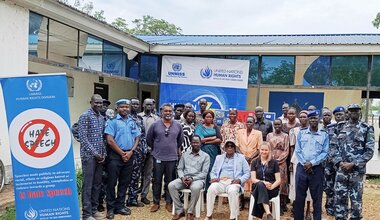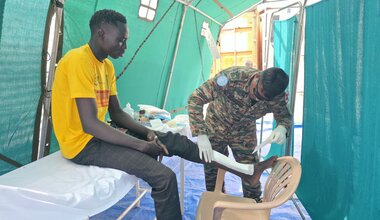Remarks by the Secretary-General's Special Representative and Head of UNMISS, Nicholas Haysom, at the 22nd RJMEC Plenary Meeting
RJMEC Interim-Chair,
Members of the RJMEC Board,
Excellencies and distinguished guests,
I thank RJMEC for convening this meeting and the opportunity to brief you today.
I would like to begin by acknowledging the positive developments in the implementation of the Revitalized Peace Agreement since the last RJMEC Plenary. First, the swearing-in of all state assemblies represents an important step in completing the formation of the governance structures as stipulated in Chapter 1, particularly at the state level. UNMISS, with our presence across all 10 states, stands ready as a partner to support the consolidation of accountable and responsive government structures.
I welcome the progress made on Chapter 2 by means of the April 3 Agreement on the Command Structures and subsequent appointments. While long overdue, I congratulate the parties for their courage in reaching a compromise and I thank the Government of Sudan for its facilitative role. The parties must now continue in the spirit of compromise and accelerate their efforts by graduating the first batch of the NUF which was promised by 3 June.
Notable progress was also made on Chapter 5 regarding the Commission for Truth Reconciliation and Healing (CTRH). It is encouraging to see that the public consultation process has begun in earnest through dispatching members from the technical committee of the Commission to different states. This process provides the platform to realize the rights to truth, justice, reparation and the guarantees of non-recurrence, by addressing the root causes of past trauma. Our collective hope is that reform and reconciliation can contribute to a more resilient society—transitional justice is a prerequisite for sustainable peace.
The recent mandate extension of the National Constitutional Amendment Committee (NCAC) and the passing of the Political Parties (Amendment) Bill by parliament is an example of promising results once there is political will. The resumption of the NCAC, supports the legislative process and in particular allows for the review of the National Elections Act 2012. This in turn will provide the legislative framework for launching the electoral process, including the reconstitution of the National Elections Commission. This process is fundamental for South Sudan to exit the transitional phase. The pace with which the parties pass the electoral bill and reconstitute the NEC will demonstrate their commitment to the timelines for conducting free, fair and credible elections. There is no reason why the government of national unity, and in particular, the TNLA cannot promptly put in place the necessary legislative framework to prepare for elections, and to effect the required Judiciary and Financial reforms.
Ladies and Gentlemen,
Allow me to recall the commitment made during the February Plenary meeting on providing a Roadmap that would enable the prioritization of outstanding tasks. This Roadmap, with benchmarks and timelines, serves as a recommitment of the parties to the R-ARCSS as well as an entry point for the international community to provide more targeted support to accomplishing the priority transitional requirements and benchmarks.
Turning now to the alarming scale of sub-national violence particularly in Eastern Equatoria, Unity, Warrap and Jonglei States; this violence continues to sow divisions amongst communities and unleash suffering on innocent women, children, and men, including through SGBV. Early this month, UNMISS led a visit alongside diplomatic counterparts to Bentiu, Leer and Mirmir to express solidarity with the local people and condemn violence against the communities. In this regard, I welcome the setting up of the government’s high-level investigation committees to investigate incidents of violence.
UNMISS has offered logistical support to facilitate government-led efforts to conduct investigations in recent conflicts such as in Leer, Unity as well as in Magwi, Eastern Equatoria. Allow me to underscore that the government bears the prime responsibility to deescalate tensions, protect its population, and ensure safety and security at all levels of the country. I urge the government to hold those responsible to account as this is key towards breaking the cycle of impunity.
The imperative to make progress in peace implementation is also prompted by the dire humanitarian situation. An estimated 8.9 million people, more than two-thirds of South Sudanese population, including 2 million women and 4.6 million children, are in significant humanitarian need. In March, 61,010 individuals, including 54 percent children, were added to the 2 million displaced population particularly due to inter communal violence. In addition to inter-communal violence, the ongoing climatic shocks and associated recurring floods threatens the livelihoods of a vast majority of the already vulnerable people, especially women and children. As the needs grow, our resources are diminishing. At the moment, we are experiencing funding constraints, with only 25.2 per cent of the $1.7 billion pledged for life-saving assistance and protection services received.
Time is of the essence in view of the looming end of the transitional period. To underline our main concerns, the government and the parties must work with a sense of urgency to:
- Pass the constitutional making process bill.
- Graduate the first batch of the NUF and progress the 3 April agreement.
- Work with NCAC to expediate the National Elections Bill process.
- Agree a Roadmap to exit the transitional period with free, fair and peaceful elections.
Mr Chairman,
On 29 May, the United Nations celebrated the International Peacekeepers Day. The theme for this year’s celebration was “People, Peace and Progress: The Power of Partnership”. We call upon all the stakeholders to strengthen partnerships, and prioritize the needs of the people. The people of South Sudan deserve to reap the benefits of peace and progress.
Everyday counts. Allow me to reaffirm the support of the UN in these challenging times to our collective, and what must necessarily be extraordinary, efforts.
I thank you.
 UN
UN United Nations Peacekeeping
United Nations Peacekeeping





